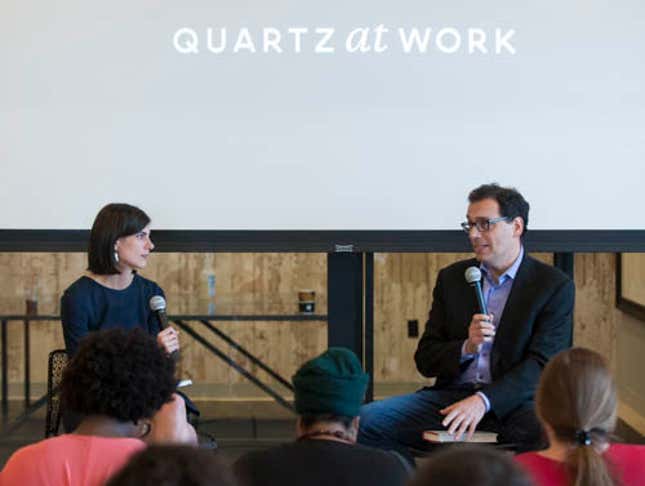If you’re lucky, you work for one of today’s forward-thinking companies. This doesn’t guarantee you have terrific perks (though you might), and it isn’t contingent on having lucrative pay. The companies that meet the deepest needs of its people are those that offer their employees autonomy, says Daniel Pink, author of Drive: The Surprising Truth About What Motivates Us (Riverhead Books, 2011) and other books on work, management, and cognition.
Science shows that employees want to be self-directed and that they flourish when they’re left alone as much as possible, Pink told Quartz at Work deputy editor Sarah Kessler this week during a conversation in Washington DC on the gig economy. ”When the product ships, it’s the default setting,” he said.

In a sense, Kessler’s recent book Gigged: The End Of The Job And The Future Of Work (St. Martin’s Press, 2018) is all about that desire for independence. Liberation from company ties is part of the utopian promise behind jobs driving for Uber or becoming a “tasker” for TaskRabbit. In Gigged, Kessler investigates the liberating ethos and terrible trade-offs of this new economy by following several people working in such positions. She discovers why the revolution in “independent contractor” work—which comes without guarantees for minimum wages, paid vacation, or health benefits—is paradise for one slice of the population, but has been disappointing, and in some cases devastating, for others.
In a more perfect world, a person would have both the freedom that comes with being a so-called “micro-entrepreneur,” and the security of a steady paycheck, benefits, and training. Pink is optimistic that companies are getting there, and indeed some have already arrived.
You can recognize these firms by their nap rooms and policies that allow workers to come and go at the hours that make sense for their job. “What we’re seeing is a slow imperfect move of corporations going with the grain of human nature than against,” he said.
And if you don’t work at one of these enlightened companies?
“You work the margins,” Pink suggested, “and you try to make whatever small change you can, in your own realm.”
Small wins, not moon shots
This means that if you’ve been at a company for enough time, “maybe you have a conversation with your boss about taking one afternoon to work from home,” Pink says. Perhaps it ends up being two hours. Still, he says, “That’s better than zero.”
People are also frequently unhappy about a lack of feedback at work. In most places, the mechanisms are atrocious, impersonal, and archaic, Pink said. The solution? Organizing your own feedback group. “At the beginning of the month, you get together, and you set a goal of what you want to do,” he explained, “and at the end of the month, you hold each other accountable.”
“That’s not going to make a crappy job into a good job,” he cautioned the crowd at the July 24 event. “It’s going to make things a little bit better.”
It’s also more aligned with the way progress happens. “Whether [we’re thinking about] change at the individual level or corporate level, we’re seduced by the language of moonshots,” he said, though actual dramatic leaps forward are rare. “Moonshots are cool, they sound good,” he said, but “small wins is how the world works.”
Where autonomy fails
Kessler’s profiles of gig workers illustrate where the dream of total autonomy falls short. For instance, she writes about Kristy Milland, a mother in Toronto who “made $40,000 in one year, literally five cents at a time,” Kessler said.
Milland was a freelancer on Mechanical Turk, an Amazon company where people bid to pick up the grunt work in software development and various other online jobs. They might label a batch of a thousands of photographs as “cats,” to teach an A.I. algorithm what a cat looks like, Kessler explained, and get paid a tiny sum per photo.
While it was a plus for Milland to be her own boss through the platform, there was a cost; it took, said Kessler, “sleeping in her office, getting carpal tunnel, and not taking a break because she didn’t have any sick days.”
Spoiler alert: Milland eventually leaves Mechanical Turk behind and returns to school with plans to seek more advanced work. In doing so, she embodies a vision of the future where, Pink believes, people will be able to come and go from full-time jobs to freelance jobs seamlessly, depending on their circumstances or family choices. Already, he says, it’s getting more and more acceptable to flee the 9-to-5, at least temporarily.
Two decades ago, “when you left corporate America to go to ‘free agent nation,’ you basically had to renounce your citizenship,” said Pink. “Now the border is much smoother. You can do your own thing for a while, then get a job, then do your own thing, then get a job.”
That’s good news for anyone currently under the thumb of an overly controlling employer.
